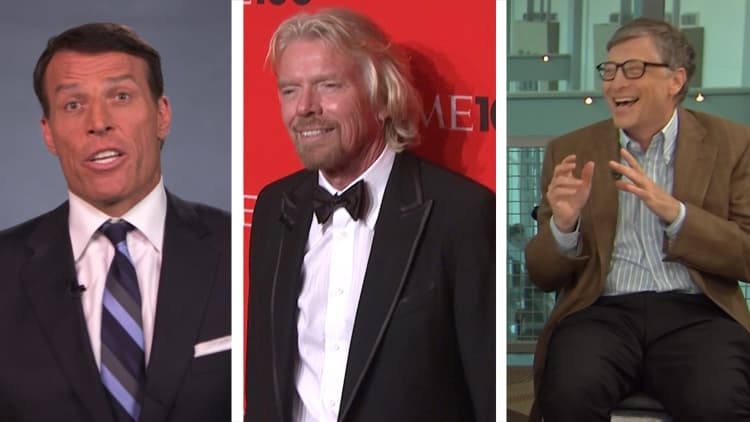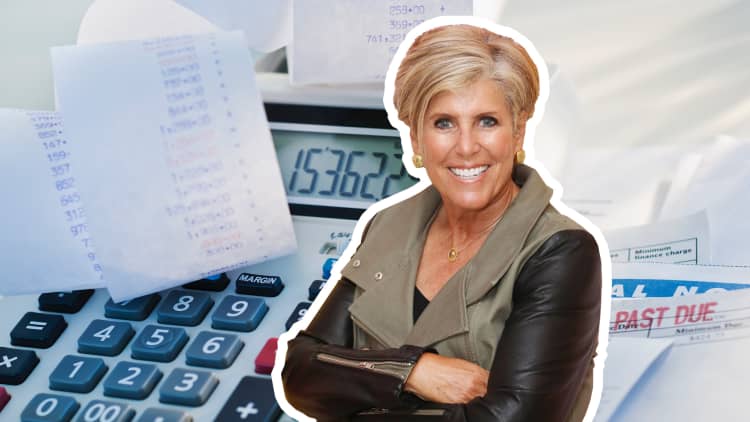If you've ever ended up in tears over money, you're in good company. More than half of Americans admit they've cried because they didn't feel like they had enough, according to The Secret Financial Lives of Americans report by Nonfiction Research based on research and a survey of over 2,200 U.S. adults.
It is, after all, incredibly common to be just scraping by. Over 70 percent of U.S. adults say they'd find it difficult if their paycheck was delayed by a week, according to a survey of over 30,000 adults conducted by the American Payroll Association released in September, and a majority of Americans have less than $1,000 in savings.
But even many high-earners feel overwhelmed: 41 percent of those who make over $200,000 say they've broken down at some point because they felt like they were coming up short.
That stress is largely about your mindset, your lifestyle and how much money Americans generally think is "enough," Saundra Davis, a financial coach and adjunct professor at Golden State University, tells CNBC Make It.
"There are only three things you can do if you are not happy with your financial situation: Make more, spend less or a combination of the two," Davis says. "There is no other magic."
That said, a few simple adjustments can make you feel vastly better about your situation. Here's a three-step process you can follow to get you on the right track.
Get organized
Start by getting back to basics, Davis says. Before even starting to plan what you need to do, take stock of where you're at. The first step is to assess what matters most.
"Know where you are and know what you want," she says. You need to ask yourself, What is your desired outcome? Do you want to make more money? Reduce your expenses? Maintain your current standard of living?
Be really clear about what you want and what's achievable.
And be realistic, she says. Don't expect yourself to go immediately from saving $0 to putting away $400 a month. If you can barely save $40, start by trying to save $40.
"This truly does mean starting where you are and giving yourself permission to set forward on a new journey," Davis says.

Focus on the future
Everyone makes mistakes, Davis says, but it doesn't help to beat yourself up over them: "Grab the lesson and leave the shame."
Don't abuse yourself — that can actually immobilize you and make it difficult to move forward. If your financial situation is causing you stress, identify ways to bring some self-care into your plan to make it better, she recommends.
And don't compare yourself to others, Davis says: "Recognize that the noise is not necessarily your truth." Despite the booming economy, and whether you know it or not, many people are also having a hard time. Focus on your own reality and what you can control.
Build a new mindset and habits
Once you've got a handle on your situation, it's time to build new, lasting goals. That means first understanding what a goal is.
"'I want to be debt-free' is not a goal," Davis says. "That is an activity that gets you to whatever the goal is," like, perhaps, freedom and financial independence.

"Look at your current financial choices and decide whether or not those choices are moving your toward or away from your desired outcome," she says. For example, if financial freedom is your goal, every time you use a credit card, you should be thinking about whether the purchase is moving you further away from what you want.
"Is the thing you're buying worth the freedom you're giving up?" Davis asks.
Of course, she admits, it's not easy to shift your thinking. So start small. Save $5 and actually put it into savings, or cook dinner once a week and take the money you would've spent going out and deposit it.
Davis uses her daily coffee habit as a starting point. She pays $3.50 for her coffee and she matches that by putting $3.50 in savings account as well. "If I can't afford $7, I don't have any business being in there," Davis says. "If I can give $3.50 to [my coffee shop], why can't I give $3.50 to myself?"
"It truly is about changing your mindset and then creating different habits," Davis says.
Don't miss: Here's how much money you have to earn to be considered upper-class
Like this story? Subscribe to CNBC Make It on YouTube!



